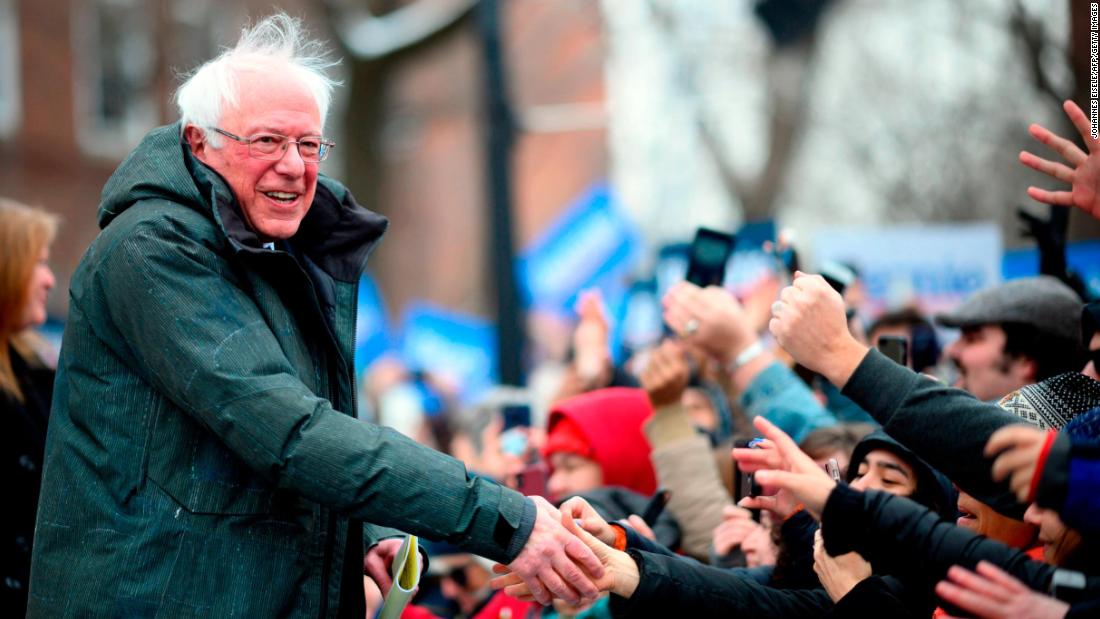
He talked about the "three-and-a-half room, rent-controlled apartment" his parents and brother shared in Flatbush, not far from here in Brooklyn.
He recalled his mother, who died soon after Sanders began college, and her dream -- unrealized -- of moving to "a home of our own."
But then, in the midst of delivering the most personal remarks of his political career at the first major rally of his 2020 campaign, Sanders veered off the somber script.
"I know where I came from!" he howled, a hint of exuberance in his voice. "And that is something I will never forget."
The crowd of around 13,000 supporters, according to a campaign estimates, many of them having spent the preceding hours tapping their sludgy feet to a live band after queuing up around Brooklyn College's East Quad early Saturday morning, roared back.
Sanders is already striking a different chord as he seeks the Democratic nomination a second time. He has a new campaign manager, a more diverse staff and an inner circle of advisers -- some familiar, some new to the fold -- that, in its opening stages, has already achieved a small feat: they convinced the 77-year-old Sanders that, as he seeks higher office again, he must be willing to step out of his comfort zone and tell Americans who he is, where he came from -- and why it matters.
That personal story took center stage on Saturday before Sanders made his first appearance. Sanders' wife, Jane, spoke first, and close ally Shaun King, an activist and journalist, spoke the names of Sanders' uncles, an aunt and her daughter who were killed in the Holocaust "when Bernie was just a baby boy" during his introduction.
"Because we never heard those stories (of Sanders' youth), for most of us in our minds Bernie has always been a disheveled, gray-haired bespectacled politician," King said. "For most of us, Bernie starts in our minds for who he is right now, today."
Sanders took steps toward offering a broader picture of his life, describing what took him from that small apartment in a Jewish neighborhood haunted by the shadows of those killed in the Holocaust, always brushing up against the edges of financial hardship, and shaped the figure now pitching a "political revolution" to a progressive grassroots that seeded his new campaign with $10 million in its first week.
"My experience as a child living in a family that struggled economically, powerfully influenced my life and my values," Sanders said on Saturday. "I know where I came from, and that is something I will never forget. Unlike Donald Trump, who shut down the government and left 800,000 federal employees without income to pay the bills, I know what it's like to be in a family that lives paycheck to paycheck."
Sanders is more likely to discuss Trump by name than some of the other front-running Democratic primary candidates. He regularly describes the President as a "racist and xenophobe," and once again in Brooklyn warned against allowing "Trump and his friends to divide us up."
"I learned a great deal about immigration as a child because my father came from Poland at the age of 17, without a nickel in his pocket. Without knowing one word of English," Sanders said. "He came to the US to escape the crushing poverty that existed in his community, and to escape widespread anti-Semitism. And it was a good thing that he came to this country, because virtually his entire family (in Europe) was wiped out by Hitler and Nazi barbarism."
At times, the contrasts with Trump were more direct. Sanders joked that unlike the President, the son of a wealthy real estate developer in nearby Queens, he made due with a more modest allowance --- "25 cents a week."
"I did not come from a family of privilege that prepared me to entertain people on television by telling workers, 'You're fired,'" Sanders said, turning Trump's tagline from "The Apprentice" into a class cudgel. "I came from a family who knew all too well the frightening power employers can have over everyday workers."
Connecting his lived experiences to his politics, and casting them together as the best antidote to Trumpism, is a departure from Sanders' typical message, but a clear and perhaps obvious strategic pivot. On Sunday, after a stop in Selma, Alabama, Sanders will return to Chicago for a speech expected to address his political awakening.
Still, the message here — and the biggest applause lines — were the familiar ones. Sanders railed against powerful business interests, from the fossil fuel industry to corporate retailers who fought their workers' organizing efforts and had to be badgered into offering employees a "living wage."
He warned the private health insurance industry that its days were numbered.
"Whether you like it or not, the United States will join every other major country on earth and guarantee healthcare to all people as a right," he said. "All Americans are entitled to go to the doctor when they're sick and not go bankrupt after staying in the hospital ... We will pass a Medicare for all single-payer program."
But those notes did not write the song on Saturday. A day earlier, Sanders campaign co-chair Nina Turner told CNN that after 2016, the Vermont senator had a new task and that it was up to him to deliver.
"This time around, people really, truly understand his mission," Turner said, "but they don't know the why. And him telling his story will give them the why."
Bagikan Berita Ini














0 Response to "'I know where I came from!': Sanders begins 2020 campaign with personal speech in Brooklyn"
Post a Comment